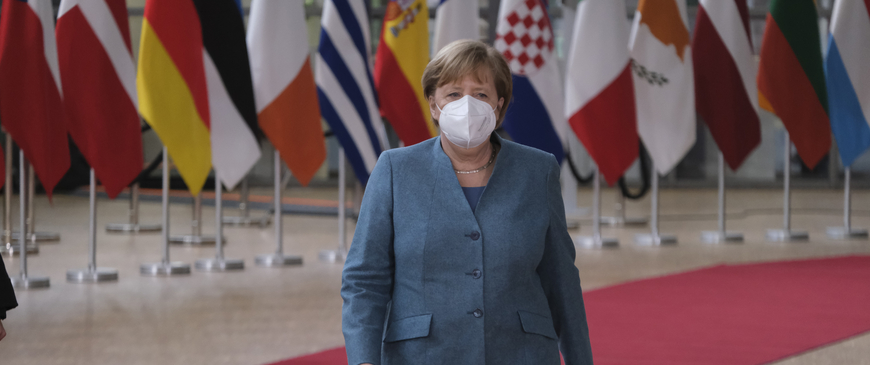
Europe's year zero after Merkel
The German election in September 2021 marks a new beginning in European politics. Angela Merkel, Europe’s most inflential leader – by size of her country, her experience and skill – will leave the stage for good, leaving a hole to be filled. The Christian Democrats (CDU) have decided, for now, that Armin Laschet, the prime minister of North Rhine-Westphalia, Germany’s biggest state, should follow her as party leader. However, his low popularity among voters will limit the CDU’s overall appeal. Moreover, his inner-party rival, the conservative Friedrich Merz, was able to secure almost half the vote. That shows a deep split in the CDU on the future course, which the party will struggle to contain.
On current polls, the outcome of this year’s federal election is fairly obvious: a coalition of the CDU with the Greens enjoys the broadest popular support. The Greens and their eminently sensible and measured leadership are keen to be part of the next government, and the CDU always wants to govern – one could go as far as to say that this is the sole purpose of the CDU and its Bavarian sister-party the CSU: to govern, so that the others can’t.
But current polls have three flaws. First, they do not abstract from Merkel. Voters will struggle for some time to separate the CDU from her when asked which party they prefer. Second, the Covid-19 pandemic has catapulted the CDU back to almost 40 per cent, for its calm and reasonable (albeit far from perfect) leadership during this crisis. On the eve of the pandemic, the CDU stood at 26 per cent, which is the level to which it will return, once the crisis is over. Third, the election takes place in September, after Germans have had the ‘summer of all summers’ with the worst of the pandemic behind us. In such an atmosphere of optimism and new beginnings, a party that sells the status quo of the past may struggle to find voters.
Merkel’s unique selling point has been her refusal to play culture war. With this style of politics, she has managed to be the voice of reason, the calm manager of the German consensus who deftly has used political opportunities to solve divisive issues. This has opened her party to CDU-sceptic centrists. She has also stripped the CDU of its anti-immigration image. Her handling of the refugee crisis stands out, and it pushed the ‘migrant vote’ (Germans with foreign roots) to the CDU. Add that she has been the female leader among men, and you get a very unique set of new supporters for the CDU that her successor will struggle to keep tied to the party in September.
The election is thus wide open and may yield quite a few possibilities to form a government. Even a leftist coalition with the Greens, the Social Democrats (SPD) and the Left party seems possible – or a so-called traffi c light coalition of Greens, SPD and the pro-business FDP (whose colour is yellow). That means that together, the Greens and the SPD may well have options that exclude the CDU, which increases their political leverage on the centre left.
Will they use it for Europe? The SPD has rarely used the precious few bargaining chips it has had in coalition negotiations with the CDU for European progress. That is understandable, considering the electoral beatings it has had to endure and the broadly orthodox economic consensus in Germany it has been up against. But in a team with the Greens, the SPD may well push some ideas through the German parliament that were hard to get past the CDU before, such as a meaningful eurozone budget, or a common unemployment insurance. Importantly, the German economic model may shift towards stronger worker protection and higher wages as well as more public investment and slower fiscal consolidation. While the German debt brake is hard to get rid of, since it was written into the constitution in 2009, there are plenty of workarounds that can be explored first.
If the numbers only allow a CDU-Green coalition, much will depend on what the Greens prioritise. But they are the German party that puts Europe highest on their agenda and they will enter these talks brimming with confidence. Policies that can be given a green tilt – a larger climate investment budget for the EU, say – stand the best chance. But the Greens will be keen to make Europe stronger, and they consider more general fi scal integration as part of that.
In truth, all those hoping for a radical renewal of Germany’s European policies will be disappointed. German politicians are not elected because they promise change. Even in 1998, when even CDU voters wanted to get rid of then-chancellor Helmut Kohl, Gerhard Schröder had to promise not to change too much. Germany will not come out of the election as the Europe hegemon full of ideas, nor agree to a sizeable transfer union. It will not end up spending much more on defence nor suddenly become tough on China. The German consensus, fi rst and foremost, is on preserving European unity and the integration Europe has already achieved, and proceeding stepwise from there. A progressive majority in September simply means that these steps will go in a different direction.
Christian Odendahl is chief economist at the Centre for European Reform.
You can read the full publication here.
